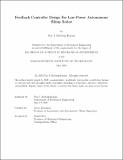| dc.contributor.advisor | Karaman, Sertac | |
| dc.contributor.author | Ilerbaig-Bajona, Pau J. | |
| dc.date.accessioned | 2025-08-21T17:00:53Z | |
| dc.date.available | 2025-08-21T17:00:53Z | |
| dc.date.issued | 2025-05 | |
| dc.date.submitted | 2025-06-17T16:10:50.041Z | |
| dc.identifier.uri | https://hdl.handle.net/1721.1/162423 | |
| dc.description.abstract | Low-power autonomous robots are able to do things that humans cannot do alone, ranging from small robots that traverse through the human body or other tight spaces to surveillance and monitoring robots that perform extended missions. Navigation is a key power draw for these robots, and thus, their motion planning must be designed to minimize power usage. In order to test motion planning algorithms, a low-power autonomous blimp robot that uses buoyancy to reduce power requirements for three-dimensional movement was designed. The blimp has two forward-facing rotors and two vertically-facing rotors. Due to the underactuated nature of the robot, the blimp cannot be translated sideways, thus leading to a coupling of the blimp’s two horizontal degrees of freedom. To control this, we present a controller for the blimp robot with three separate PID control loops: one for altitude control, one for angle control, and one for proximity approach. Additional fuzzy logic is implemented to improve performance and limit inefficiencies in the dynamic system and controller, such as turning towards the goal first before approaching forward. Combining the PID control loops and fuzzy logic allows for movement from a start point to a goal point, remaining within a 0.3 m radius of the goal point once it is reached. Further work that can be done to improve the physical system and controller is discussed, such as balancing the blimp gondola and rotors, as well as implementing different, physics-based controllers. | |
| dc.publisher | Massachusetts Institute of Technology | |
| dc.rights | In Copyright - Educational Use Permitted | |
| dc.rights | Copyright retained by author(s) | |
| dc.rights.uri | https://rightsstatements.org/page/InC-EDU/1.0/ | |
| dc.title | Feedback Controller Design For Low-Power Autonomous
Blimp Robot | |
| dc.type | Thesis | |
| dc.description.degree | S.B. | |
| dc.contributor.department | Massachusetts Institute of Technology. Department of Mechanical Engineering | |
| mit.thesis.degree | Bachelor | |
| thesis.degree.name | Bachelor of Science in Mechanical Engineering | |
